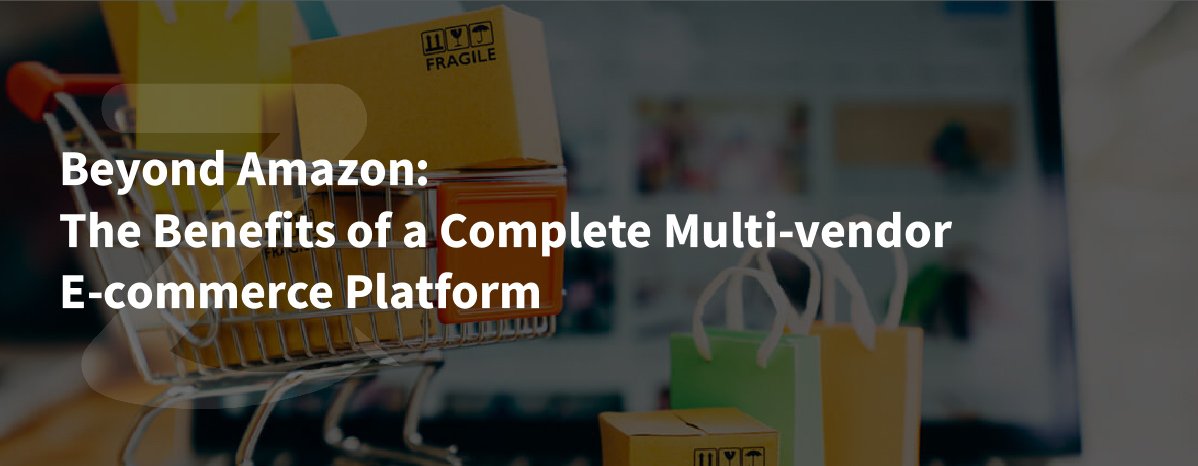
Tagged with:
Benefits of using a complete e-commerce solution
Publish At:
15 Apr 2023, 07:30
Looking to expand your e-commerce business beyond Amazon? Discover the advantages of a comprehensive multi-vendor platform in "Beyond Amazon: The Benefits of a Complete Multi-vendor E-commerce Platform". Streamline your operations, increase sales, and enhance your customer experience with this essential guide.
Description:
In recent years, Amazon has become a household name when it comes to e-commerce. However, relying solely on Amazon as your sales channel can come with drawbacks. That's where a complete multi-vendor e-commerce platform comes in. In this article, we will explore the benefits of using a multi-vendor e-commerce platform beyond Amazon.
In today's rapidly evolving e-commerce landscape, businesses are constantly searching for ways to streamline their operations and increase revenue. One solution that has been gaining popularity is the implementation of a complete multi-vendor e-commerce platform. While many businesses have relied solely on Amazon to reach customers, a multi-vendor platform offers a range of benefits that can help take your business to the next level. In this article, we will explore the advantages of a complete multi-vendor e-commerce platform and how it can help you expand your business beyond Amazon.
- More control over your branding and customer experience
When you sell exclusively on Amazon, you have limited control over the look and feel of your storefront. With a multi-vendor e-commerce platform, you can customize your storefront to match your brand's identity and create a unique customer experience. You can also control the product descriptions, images, and other content on your page, which can be critical for converting visitors into buyers.
- More flexibility and customization
Amazon's platform has strict rules and regulations that sellers must follow. While these rules can help ensure a level playing field, they can also limit a seller's ability to customize their storefront and product listings. With a multi-vendor e-commerce platform, you have more flexibility to tailor your storefront to your needs and preferences. You can also choose from a range of customization options, such as integrating with different payment gateways, shipping providers, and other third-party services.
- Increased exposure to new customers
Selling on Amazon can be a great way to reach millions of potential customers. However, it's also highly competitive, and it can be challenging to stand out from the crowd. With a multi-vendor e-commerce platform, you can tap into a wider audience by leveraging the platform's marketing and advertising tools. You can also benefit from the platform's community of sellers, who can help promote your products to their own customers.
- Greater control over pricing and margins
Amazon has a reputation for driving down prices, and as a result, it can be difficult for sellers to maintain healthy profit margins. With a multi-vendor e-commerce platform, you have greater control over your pricing strategy and can adjust your prices to match market demand. You can also set your own commission rates and fees, which can help you maximize your profits.
- Better customer support
One of the biggest challenges of selling on Amazon is dealing with customer support issues. With a multi-vendor e-commerce platform, you can benefit from dedicated customer support teams who can help you resolve issues quickly and efficiently. This can help you maintain a positive reputation and build customer loyalty over time.
6. Increased Reach and Exposure
One of the most significant benefits of a multi-vendor e-commerce platform is the increased reach and exposure it provides. Rather than relying solely on your own website or Amazon, a multi-vendor platform allows you to tap into the customer bases of other sellers on the platform. This means that your products can be viewed by a much larger audience, increasing your visibility and the likelihood of making sales.
Additionally, multi-vendor platforms typically offer marketing and promotional opportunities that can further boost your visibility. For example, many platforms have featured seller programs, email newsletters, and social media campaigns that can help you stand out from the crowd.
7. Diversified Revenue Streams
Another benefit of a multi-vendor e-commerce platform is the opportunity to diversify your revenue streams. By selling on multiple platforms, you are not reliant on any one source of income, which can be especially beneficial in times of economic uncertainty. Additionally, selling on a multi-vendor platform allows you to experiment with different pricing strategies and product offerings, which can help you optimize your revenue and profitability.
8. Streamlined Operations
Managing an e-commerce business can be a time-consuming and complex process, especially if you are selling on multiple platforms. A multi-vendor e-commerce platform can simplify your operations by providing a single dashboard where you can manage all of your sales and orders in one place. This can help you save time and reduce the risk of errors or oversights.
Another advantage of a multi-vendor platform is that it typically handles the technical aspects of running an e-commerce site, such as hosting, security, and maintenance. This can save you the hassle and expense of managing these aspects yourself.
9. Greater Control Over Branding and Customer Relationships
When you sell exclusively on Amazon, you are limited in your ability to control your brand identity and build relationships with your customers. On a multi-vendor platform, however, you have greater control over your branding and the customer experience. This can include customizing your storefront, creating branded packaging, and communicating directly with customers.
Additionally, because you are selling on your own storefront within the platform, you can capture customer data and use it to build relationships and loyalty. This can be especially valuable for businesses that rely on repeat customers or want to develop a community around their brand.
In conclusion, while Amazon can be a great sales channel, it's important to consider the benefits of a complete multi-vendor e-commerce platform. By taking advantage of the customization, flexibility, and marketing tools offered by these platforms, you can create a unique customer experience, reach new audiences, and maintain greater control over your pricing and margins.